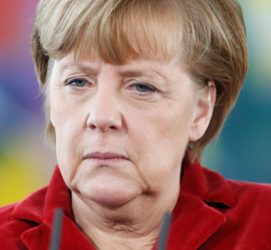BERLIN, (Reuters) – A humiliating state election defeat for Angela Merkel in her own backyard yesterday and another drubbing that looms in two weeks in Berlin are casting an ominous shadow over the Chancellor’s hopes of winning – or even running – for a fourth term in 2017.
Analysts expect Merkel to weather the storm brewing over the debacle in the rural state of Mecklenburg-Vorpommern yesterday, where her Christian Democrats (CDU) fell to a shock third place behind the centre-left Social Democrats (SPD) and the upstart anti-immigrant Alternative for Germany (AfD) party.
But the chancellor, whose towering approval ratings had long carried her party to victories at the polls over the last 11 years, has suddenly turned into a liability amid a frightening fall in support. Conservatives, who feel they have a lock on power after ruling the country for 47 of the last 65 years, are blaming Merkel’s pro-refugee stance for their mounting losses.
The AfD latched onto the issue with a vengeance following the arrival of one million refugees in the last year and turned it into a battering ram against Merkel, who made a lonely decision a year ago to open the gates for people fleeing war and turmoil.

“People will see this as the start of the ‘Kanzlerdaemmerung’ (twilight of the chancellor),” said Gero Neugebauer, political scientist at Berlin’s Free University, of the defeat in her home district.
“If a lot of CDU members start seeing this defeat as Merkel’s fault, and members of parliament start seeing her as a danger for the party and their own jobs in next year, the whole situation could escalate out of control. If the AfD beats the CDU again in two weeks in Berlin, things could get ugly fast.”
Discontent over Merkel’s welcoming of refugees has spread even to the rural northeastern corner of the country in a state that has the fewest number of foreigners in Germany. There are only 20,000 refugees there and just 65,004 of the state’s 1.6 million residents are foreigners.
A recent poll showed her approval rating fell from 67 percent to a five-year low of 45 percent. Her conservatives would win just 33 percent, down from 41 percent a year ago, according to the Infratest Dimap poll by ARD TV.
That would cost 30 of the 310 MPs their jobs next year.
“The only issue voters care about right now is (Merkel’s) irresponsible migrant policies,” said Leif-Erik Holm, the leader of the AfD in Mecklenburg-Vorpommern. “It’s not what people want. I think this is the beginning of the end of Merkel.”
It has suddenly become unclear whether Merkel will even get the chance to run for a fourth term. According to a Der Spiegel magazine report, she has postponed an announcement about her candidacy due to resistance from her Bavarian sister party, the Christian Social Union.
There have been persistent rumours that CSU leader Horst Seehofer is considering running. He has demanded that Merkel put limits on the numbers of refugees. The CSU seized on yesterday’s rout as more evidence Merkel needs to change.
“We need a limit on refugees and quicker deportations,” said Andreas Scheuer, deputy leader of the CSU, told Der Tagesspiegel daily.
Thomas Jaeger, political scientist at Cologne University, told Reuters that Merkel was down but far from out.
“It’s definitely a slap in the face for her and her policies,” said Jaeger. “She’ll long be blamed for letting a party to the right of the conservatives get an established foothold. But there’s no one in the party who’ll try to topple her. And if anyone tried, they’d get their teeth knocked out.”




